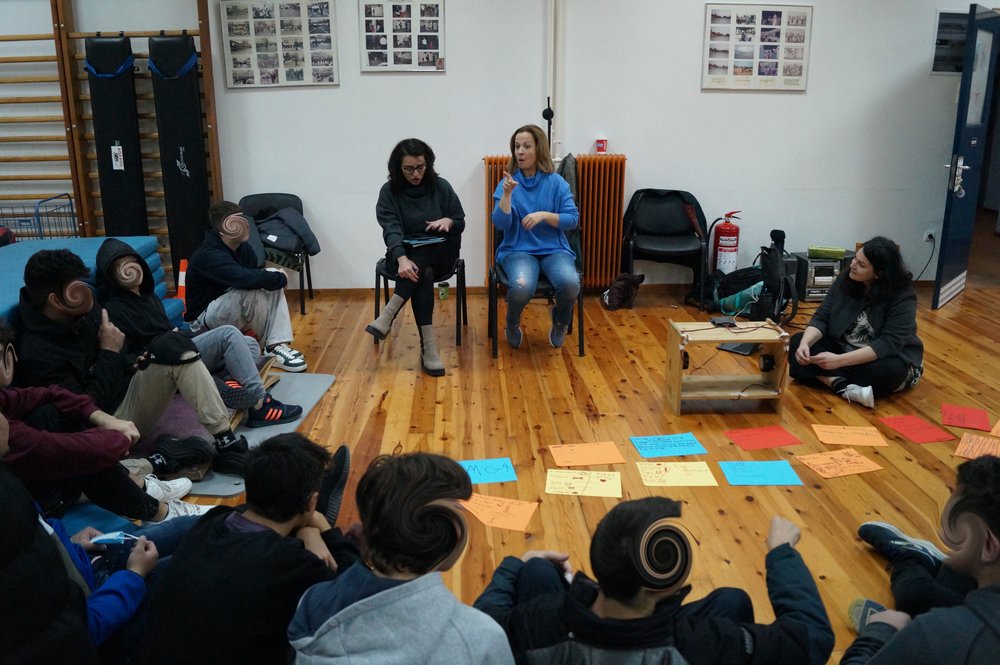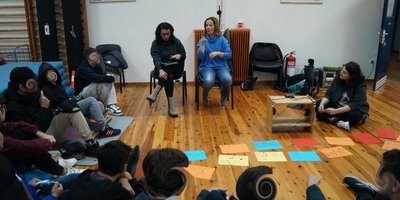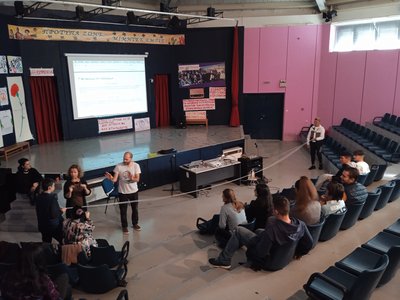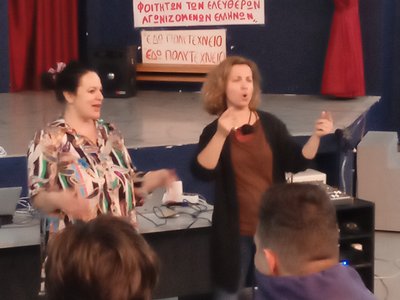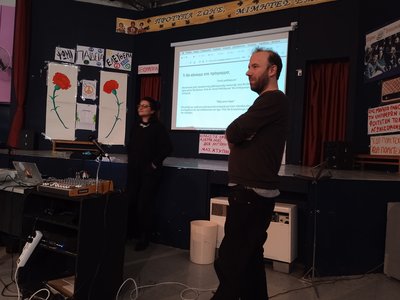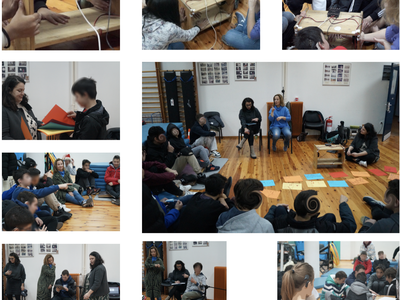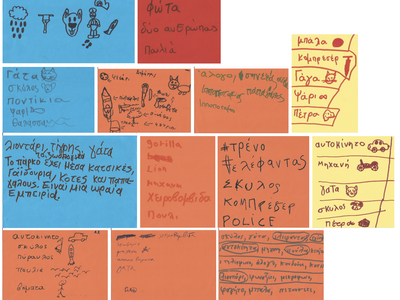Facilitator Kalliopi Takaki
I was thrilled when Dana Papachristou and Yorgos Samantas invited me to collaborate on the project "Tangible Radio - Class on Air".
I had already been working for five years with children and teenagers, conducting radio workshops in public schools. Coming from a background in theatre and radio, I had facilitated workshops with children, initially using the tools I have mastered as a professional. Very soon, however, I realized that in order for children to be able to create, to be "heard", you need to allow yourself to "forget" what you know, to move, so that you manage to listen to their rhythms, their feelings, their thoughts, and let yourself go along the path that they, eventually, open up for you.
So, when I was asked if I had a ready-made presentation on what radio is, to adapt it to the context of a school for Deaf and hard-of-hearing kids, I answered negatively. I don't use presentations, there is no lesson in the workshops, there is no specific methodology. I turn on the microphone and initiate dialogue. I allow children to express themselves freely, to introduce themselves, to play with their voice. We meet in equal terms and discuss: what the voice is, what sound is and, ultimately, what radio is. We ask questions such as: why did I choose these words and not others? Why did I speak with this voice and not another? In how many voices can a person speak? How is anger and how is joy registered sonically? What do I want to talk about and, most importantly, why do I want to do so?
All of the above have been recurring themes in workshops involving hearing children. "Improvisation" in such groups is always achieved.
But in "Tangible Radio - Class on Air" project, most of the participating students had never listened to the radio before, and probably don't know its importance and usefulness. How would we manage to capture the voices of Deaf and Hard of Hearing children, and who would be willing to use their Deaf voice, which is rarely heard publicly? How would we incite their imagination to tell a story that would be broadcasted? How would we explain and ask children who have never heard radio to do a radio show?
A considerable amount of literature was shared with the rest of the working group. But the first and, perhaps, the most important step in understanding this new world for me occurred in the Master Class with David Bobier and Leslie Putnam. The discussions and presentations that occurred this week in September at TWIXTlab were a useful and enlightening introduction to what followed in this collaboration. Then, the conversations I had with pedagogist and Sign Language interpreter, Xenia Nikolakopoulou. Xenia's input, having known the students, helped me to understand their different speeds, to understand their relationships with each other, their problems and their conveniences in order to decode, among other things, their unexpected enthusiasm. To find my own place, on an equal footing, in the group of children.
As a facilitator, my anxiety and constant personal question was whether I would be able to help them create their own story. We moved on to the second session, where we "gave" them the setting and the main idea: We cross the park in order to take our rocket to our planet. In a plae where only the Deaf and Hard of Hearing can sense sound. We started with a basic question: what do we observe in the park? The children wrote and/or drew the sounds they perceive on a walk in the park. After collecting their observations, we suggested that if any of them wished to stand in front of the microphone and describe in their voice the sounds they wrote/drew on paper. It was touching to see the children's participation. Lots of sounds, quite a few children stood up. Animals, cars, trains, drills, rustling leaves, human voices, Super Mario, the moon.
I returned from this second meeting more confident. We heard their voices. We talked with the group and I put up a story/pilot out of the sounds they have noted. Many versions of the story could have been written with these sounds, from these children's words. However, taking into account the picture I already had, I wrote a single version for each child. The pilot story was read to the children, who took it with great enthusiasm. They were ready to move on to creating their own story. The story that made history.
We then asked them to tell us what is happening to our planet. That's where we landed after the park ride. Each child continued from where the previous one had left off. A surreal story was created. Fantastic! We then asked them if they would want to read the story into the microphone. Some of them stood up bravely, their story was recorded on tape, and simultaneously placed in their memory drawers.
I can't know for sure what the children got out of this experience in the long run. I do, however, recall the hugs they generously gave us on their last day of school, their wonderful looks and their thirst for new stimulation. As the days go by I try to understand how this experience has registered with me. I have yet to find my own words, the words that could describe my feelings.
Kalliopi Takaki (radio workshops facilitator - Class on Air)
Kalliopi is an actress and sound engineer, with long experience in producing and directing radio shows. In recent years she is active in education, conducting radio workshops for children and teenagers; she has also been working as head of public affairs and communication, specializing in social media, keeping at the same time an active relationship with theatre through various positions.
Graduate of the ‘Greek Art Theatre - Karolos Koun’ (2003) with postgraduate studies in Ancient Drama, she worked in Theatre, Cinema, Radio and Television. She collaborated, as an actress and production manager, with the Athens and Epidaurus Festival, the Greek Art Theatre - Karolos Koun, the Experimental Stage of the National Theatre along with the Mirror Theatre, International Company Project, among others. At the same time she collaborated with various radio stations in Athens as a sound engineer and radio producer.
In 2007 she created radiobubble.gr, the first web radio in Greece, which has decisively influenced the Greek online sphere, and soon became, internationally, an emblematic mass media and communication channel. Since 2012 she is a member and legal representative of the Social Cooperative Enterprise Hackademy, an educational institution that specializes in Radio and Social Media training and education. Among other accomplishments, the Hackademy team has in 2013 created rbdata, the first data journalism research team in Greece, winning a number of international awards and distinctions.
